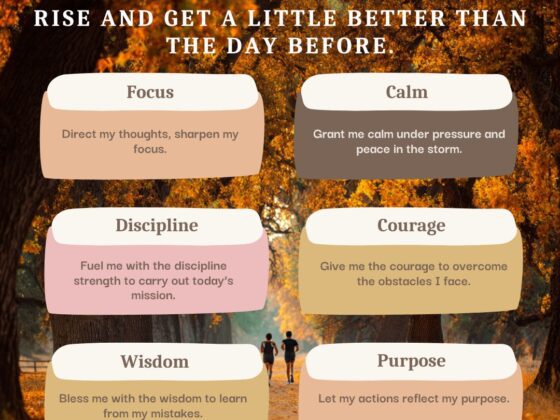A week ago, I wrote about My Guiding Principles.
I spoke about their importance because they are our fundamental values and beliefs. They shape and influence our moral behaviors, decisions, and actions.
I use my guiding principles daily to make decisions.
- Family: Should I sit around, play a video game, stare at my iPad, or go outside and play with my kids?
- Fitness: Do I eat snacks after 9 PM and binge-watch my favorite TV show, or do I maintain a 7 to 10 fast and go for a nice walk?
- Freedom: Do I outsource everything my kids learn about school or actively participate in their education?
- Flow: Do I exist in my life, following the current of time, or do I try to proactively work to find the path that is rewarding and leads to continued improvement, learning, and profitability?
The last guiding principle is faith, and I only briefly discussed it in my previous newsletter.
Faith shapes people’s worldviews, interactions with others, and decisions. It is a moral compass for making decisions. It gives us patience when dealing with people we do not like very much. Faith plays a crucial role in personal development.
I was born and raised a Roman Catholic. I tried other secular paths for many years in my teens and early adult life, but I always found myself leaning on the values I had learned earlier in life. I am still a Roman Catholic to this day.
I believe, help me with my unbelief. Mark 9:24
I struggle with my faith. So much today says we are wrong because of our beliefs and trust in God.
Many of the people I trust, follow, and learn from have different, often secular, views about our world.
Scott Adams and Elon Musk, two intelligent and influential members of society, are both proponents of the idea that we live in a simulation. Scott Adams and Elon Musk share a perspective influenced by the simulation hypothesis, which suggests that reality could be a simulated environment created by an advanced civilization.
I have listened to Scott’s podcast for nearly three years. Throughout the pandemic, he recorded live video podcasts twice daily. I value his insights and agree with many of his points. What does one do when those we trust challenge one’s faith?
There is so much in society today that challenges our faith. Secular humanism, moral relativism, political correctness, and the media are all driving new norms in society. This, along with self-doubt, can challenge anyone’s faith.
What is one to do to maintain faith as a guiding principle?
It should come as no surprise that we have challenges to our faith. There is a new trial around every corner. It is tough to have faith when surrounded by people who do not believe. Unbelievers often portray us as villains. We are viewed as narrow-minded, intolerant, bigoted, and just plain old bad guys.
How do we respond to these challenges? In my case, I already create challenges to my faith before anything in the environment creeps in. Remember, “I believe, help me with my unbelief.”
One way to do this is by translating scriptural guidance into wise counsel and practical action.
In other words, look to the bible to help shape your guiding principles.
This is how you create faith-based guiding principles.
The Bible As Your Source
The Bible is another source that provides the foundation for my guiding principles. It offers many examples worth considering, and many of these help guide the choices I make every day.
Love
What if you made an effort to love others? How about using love to keep an open mind and try to understand the perspective of others? At work, I always use this to keep my pride in check. I use this to consider the opinions others have. Thou shalt love the Lord thy God with all thy heart, and with all thy soul, and with all thy mind. “This is the first and great commandment. “And the second is like unto it, Thou shalt love thy neighbor as thyself” (Matthew 22:37–39). How would you apply this in your daily life?
In today’s world, we are quick to judge and close our minds to the opinions of others. As a result, we miss many opportunities to learn and grow.
It is hard to even like those we disagree with, let alone love.
It may be the secular nature of the world today. It may be harder to love thy enemy when the enemy has an entirely different game plan than you, looking to win at all costs.
Love as a guiding principle can profoundly impact various aspects of life. Decisions based on love can affect personal relationships, professional environments, and communities.
Consider a company where leadership adopts love as a core value. Imagine that!
This value of love does not mean romantic love but more of a deep sense of respect, care, and well-being of the employees that work there.
A CEO running a company like this might focus on employee growth, offer supportive feedback, and create work prioritizing mental health and work-life balance.
A company focusing on love benefits from increased employee satisfaction, productivity, retention, and brand reputation.
How would using love as a guiding principle impact your personal, professional, and social environments?
Compassion and Mercy
The Bible teaches compassion and mercy towards others. How would this influence your choices if you focused more on the poor, oppressed, and marginalized? “Blessed are the merciful, for they will be shown mercy” (Matthew 5:7).
By showing compassion and mercy, a father can create a nurturing and supportive environment for his children to learn and grow. He can teach them valuable lessons about empathy, resilience, and kindness.
A father using compassion and mercy as a guiding principle can manifest in many ways.
Think of a father who uses gentle discipline instead of harsh punishment. I am not talking about rolling over and taking it, but keeping calm, holding your ground, and calmly explaining so that the child understands what they did wrong and can learn from the experience.
A father who uses compassion and mercy would also be an active listener. Think about how powerful this would be in addressing your children’s, wife’s, co-workers, and family’s concerns and feelings without showing judgment. It creates the perfect environment for learning from mistakes and building closer relationships with people around you.
Justice and Righteousness
The bible emphasizes the importance of justice and righteousness. What can we do daily to help the oppressed or those who cannot help themselves? Learn to do right; seek justice. “Defend the oppressed. Take up the cause of the fatherless; plead the case of the widow” (Isaiah 1:17).
Think about a workplace where the people or management use justice and righteousness. What if everyone in that environment valued ethical principles, recognition of hard work, and integrity?
What results would a company see if it made decisions transparently and openly communicated the reasons behind those decisions? For example, explaining the reasons for organizational changes, layoff, promotions, or new policies?
What about employees and leaders taking accountability for what happens in the workplace? What if a manager openly admits an error in his financial plan and works with his team to rectify it?
How do people around you react when you lead a life where justice and righteousness are one of your guiding principles?
It creates an environment of trust and loyalty. People are more likely to trust and be loyal to someone who practices justice and righteousness and holds to higher moral standards.
You will create a positive reputation for yourself and your business. A company that builds a positive reputation through trustworthiness and accountability will attract customers, other ethical partners, and the best employees.
Humility
Humility is a virtue. In your personal and professional life, humility encourages learning and growth. It helps you remain open to new ideas, feedback, and constructive criticism. I facilitate growth and adaptation. It helps enhance teamwork by recognizing the values of others. It can foster a collaborative environment, which can help you become more successful. It reduces conflict both at home and in the office by helping to resolve or prevent conflict. “Humble yourselves before the Lord, and he will lift you up” (James 4:10).
A manager who practices humility in the workplace benefits from higher morale. Teams managed by a humble leader tend to have higher morale as they feel valued, respected, and empowered.
Employee engagement increases because they feel their leader genuinely cares about them.
Switch to being a father for a moment. Think about the fulfillment you would have if you practiced humility as a guiding principle and engaged with your wife and children at the highest level possible.
A manager who collaborates well with his employees fosters creativity and innovation. Think about a manager who does not dictate down to the team but instead provides a collaborative environment where the employees.
Think about how creative your children can be if you practice humility in disciplining their mistakes. This will help them learn and grow.
Faithfulness and Trustworthiness
Being trustworthy strengthens our relationships. It means others can rely on you to be honest, consistent, and loyal. This bond creates long-lasting, fruitful relationships in your professional and personal life. Trustworthiness is a vital characteristic of a person of integrity. There is an internal consistency to what you believe and say, which leads to a more fulfilling and content life. “His master replied, ‘Well done, good and faithful servant! You have been faithful with a few things; I will put you in charge of many things. Come and share your master’s happiness” (Matthew 25:21).
Wisdom
William Shakespeare said, “The fool doth think he is wise, but the wise man knows himself to be a fool.” Wisdom is something we learn with experience. Making mistakes, learning from them, adjusting, modifying, and growing from those experiences. Wisdom is the ability to recognize our limitations of knowledge. It helps us to remain open to new experiences and information. It helps us with improved decision-making. It allows us to use our knowledge and expertise to make well-informed decisions. It improves our ability to be practical problem solvers and critical thinkers. “If any of you lacks wisdom, you should ask God, who gives generously to all without finding fault, and it will be given to you” (James 1:5).
Forgiveness
The bible teaches us about the importance of forgiveness. Why is this important as fathers? Fathers who practice forgiveness provide a powerful example for their children. Children model themselves after us, and an incredible opportunity to teach through example. Forgiveness encourages personal growth. Forgiveness creates an opportunity for fathers to reflect on their values and priorities. It lets them reevaluate the legacies they want to leave for their children. “Bear with each other and forgive one another if any of you has a grievance against someone. Forgive as the Lord forgave you.” (Colossians 3:13).
Fathers who practice forgiveness in their homes promote stronger family bonds. It helps foster a sense of unity and support, making the house a loving and safe environment—perfect for your children to learn and grow.
When rules are broken in the home, a father explains the consequences and forgives the child, which helps them understand that mistakes are a part of learning and growing. Mistakes become a part of building experience instead of something to be feared.
A father who practices forgiveness in the home provides his children with a foundation of understanding and patience. He instills emotional security, empathy, and moral integrity. He equips his children with the tools essential for a successful and fulfilling life.
Stewardship
What the heck is stewardship? Stewardship is the responsible management or care of resources under your control. These could be financial, environmental, or personal. When applied to personal development and fatherhood, stewardship can significantly enhance how a man nurtures his family, manages resources (wealth), and contributes to his community. “As each has received a gift, use it to serve one another, as good stewards of God’s varied grace” (1 Peter 4:10 ESV).
A father who practices stewardship as a guiding principle always thinks about his family’s well-being.
He is responsible for the resources required to support his family. He manages the family’s financial, physical, and emotional resources wisely. He ensures that the family lies within its means, saves for the future, and invests wisely for growth.
He is engaged and invests in community service. He works towards providing stability for his family and creating a surplus to give back and contribute to the greater good.
Conclusion
Embracing a solid set of guiding principles can enrich our lives and provide a moral and stable decision-making framework. By integrating the abovementioned principles into our daily lives, we can cultivate a more profound sense of purpose. We can become better fathers, better husbands, and better managers.










